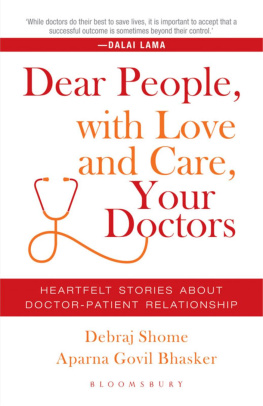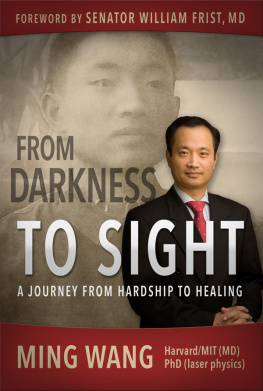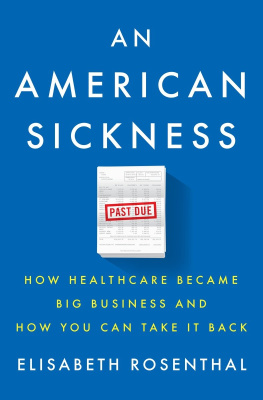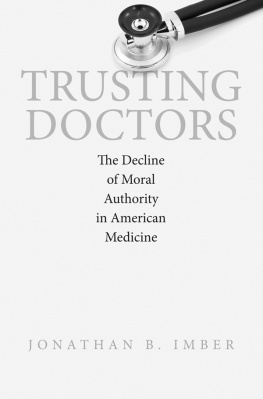Table of Contents
For Physicians
o o o
Those having torches will pass them on to others.
Prologue
SPRING 2003
Everything now seems to be about Zoe, even the kitchen sink, which I fill with warm water for her bath this spring afternoon. I lean my face into gentle steam and linger my fingers on the soft hills of her baby feet. In her face as small as the palm of my hand, I see my past and all my future.
Sleepy days and interrupted nights blur into a hazy new life, but I still make it once in a while to the university where Im the psychiatrist for the medical hospital. After a grand rounds lecture last week, lights flickered on after an hour of slides. Fellow physicians smiled and hugged me. Dora, hows your baby? Dora, when are you coming back to work? What was I to saythat on my bookshelves at home Ive cleared away textbooks with chapters Ive written, psychiatry lectures Ive given, my stethoscope and blood-pressure cuff, to make room for baby bottles and hooded towels?
But its not just that my life has changed. Medicine and psychiatry have changed.
When I chose medicine for my career, it felt such a noble profession devoted to healing the sick and guarding the sanctity of human life. But now health care seems just another business.
Behind me on my kitchen table, next to unread medical journals and a red rattle, is a tall pile of worn pagesthe book Ive been trying to write since I began my career in the early 1990s. It started as a self-help book about new medications, new therapies, and patients who got better. But after long days at work, Id come home, switch on my desk lamp, and in its soft quieting light, Id write about patients who didnt get better. These were not self-help stories, but stories I couldnt keep from writing.
Years passed. I went from job to job where my task was to prescribe medications only, not what I expected Id be doing as a psychiatrist. Health care issues increasingly made national headlines. Dusty piles of pages accumulated on my desk, yet I wasnt writing self-help stories.
After Zoe was born on a snowy November morning, everything looked new in babys light. In those wintry first days of my new life, of feedings, sleep and tired moments in between, I took a good look at the book Id been trying to write. Surrounded by pages on the floor as my baby slept, I finally saw what I had written through the years.
I saw my story, a doctor working in the medical profession as it became the health care industry.
When I was a child, my doctor lived in my neighborhood and made house calls. We had devoted, lifelong relationships with our personal physicians. But the insurance company has long replaced the doctor as a patients primary medical relationship. Even my profession of psychiatry, the medical specialty that once healed through the doctor-patient relationship only, now seems an impersonal assembly line.
Id nearly discarded the story of my patient Selena. But now I understand why I couldnt stop writing about her. By writing her story I realized that I fought not just for her life, but for my own life, a way of practicing medicine centered on science, the doctor-patient relationship, and on the everyday practice of our highest human values.
I now see what Ive been writing these years, beneath the quiet light of my desk lamp.
My book turns out to be the story of my career as a physician and psychiatristwhich also is the story of the remarkable changes that have occured in American medicine.
Curtains lift in a springtime breeze. Out the kitchen window, I see Gabriel, a stout, red-bearded young doctor with a steady strength in his step. He stands on my back porch, a notebook in his hand. On his belt hang a hospital beeper, a cell phone, and a PalmPilot.
I scoop Zoe from the sink. I pull open my back door, Zoe in my arms, bundled in a towel the color of blooming lavender fields.
Dr. Wang, Im sorry. Ill come back later, Gabriel says.
I look into his eyes that are looking at my baby. I feel his air of authority. Dr. Gabriel Schwartz, a resident in training, looks like a psychiatrist. And me? Im now a housewife in a ponytail and black velour sweats.
Come in, Gabriel. Let me get you a drink.
In my kitchen, Gabriel contemplates the photos on my fridgenewborn Zoe swaddled in hospital blankets, my parents resting on lawn chairs surrounded by peach blossoms, in-laws and friends, all fastened by magnets from pharmaceutical corporations. A Paxil note-pad reminds me to pick up laundry detergent, baby shampoo, fusilli, basil. A lime-green Effexor clip holds emergency phone numbers. Beneath a sky-blue Zoloft magnet, Chris and I honeymoon in Aloha shirts. His Mediterranean curls are wild in tropical humidity.
I started Paolo on Celexa. Gabriel sips a raspberry spritzer. Hes depressed and wants to stop his transplant medicines. His new kidney would fail and it would be passive suicide.
Why Celexa? I ask. Do we know how it affects renal transplant patients? We walk to the library, now more a nursery, a room stocked with medical books, novels, Chriss books on architecture and urbanism, and lately, diapers and chew toys.
I cant help thinking: Gabriels patient needs my old-fashioned talk-therapy skills. But tomorrow will be another patient Ill want to help, then another. In my years as chief of the Psychiatry Consultation-Liaison Service at the University of New Mexico Hospital, I saw more than a thousand new patients each year. Weekly psychotherapy was a mathematical impossibility.
So I have gotten good at letting go.
The patients health insurance wont cover psychiatry visits to prevent organ rejection, even though they paid for a new organ, even if theyll pay for intensive medical care when Paolo goes into kidney failure again and again. So Gabriel assumed Paolos case as part of his training, free of charge.
Gabriel sips his drink. He strokes his auburn hair and beard. Celexa. Its only been on the market a few months. Ill do a literature search.
Medicines are tested only by their pharmaceutical makers before FDA approval, I remind Gabriel. Celexa is so new it cant have been tested yet in transplant patients. Id switch the patient to Zoloft. I feel like John Houseman in The Paper Chase. I am also reaching for a diaper.
Zoe smiles. I breathe in her scent, of powder-fresh baby soap and the sugar musk of milk.
When I was a resident in training, I visited my professor Dr. Martha Kirkpatrick weekly at her home. After funny dinners, as she called them, sometimes of chicken quickly microwaved and yellow bulb tomatoes from her garden, wed walk down a path to her home office, a white stand-alone cube with an orange door surrounded by flowers and vines. Here the deep healing of a patients mind and body occurred without machines or medicines, but through the doctor-patient relationship, with the doctor as the instrument of change. In Marthas office overlooking the tranquil, blue Pacific, I once told her, I started my patient Eric on Prozac.
Dora, why did you medicate him? Her eyes looked puzzled. Sunset glinted from her gray hair.
In the early 1990s, psychiatrists still mostly asked Why medication? not Which medication? But the 1990s was the Decade of the Brain, when science and technology became conventionally applied toward understanding human minds, once considered too nebulous, or too sacred, to probe in this way. Insurance companies also started calling the shots, preferring to pay psychiatrists to prescribe medications, leaving psychotherapy for counselors, if at all. It was a perfect storm. Martha griped about the end of medicine and the end of psychiatry. I wrote her off as eccentric. But all of my jobs since finishing my training in 1994 have been to prescribe medications, only.










